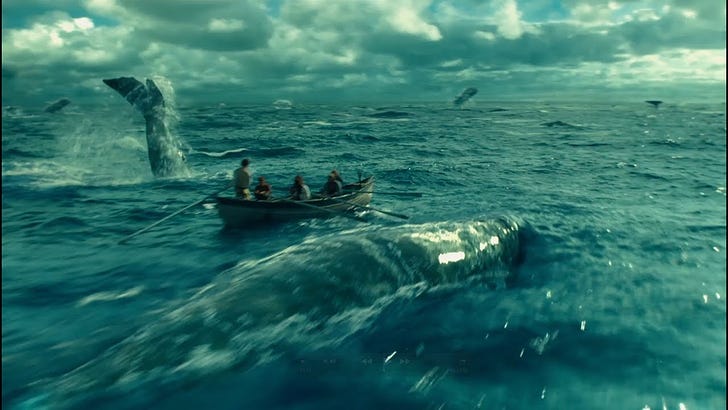In case you’ve been living under a rock of late, there's a huge movie coming out this December for which you may have already purchased tickets. The story’s a familiar one, and almost all of us are at least familiar with the basic plot, but we’re also a bit nervous as to whether the new film will live up to the original.
Of course, I am speaking of In the Heart of the Sea, director Ron Howard’s portrayal of the tale that supposedly inspired Herman Melville to write his masterpiece novel, Moby-Dick. (For those who assumed this post was about Star Wars, my apologies).
Earlier this week, I watched a “featurette” on the film, and while the visuals are impressive (Howard, director of Apollo 13, looks to have made another finely-crafted movie), I was struck by a particular quote from the brief interview with In the Heart of the Sea author, Nathaniel Philbrick:
"Those whalemen were seeing a once-in-a-lifetime event no one would have dared to make up unless it had really happened. And that’s what gave Herman Melville the courage to ultimately write Moby-Dick."
This observation—that eyewitness account and oral tradition can be trusted—flies in the face of today’s modernist emphasis that only that which is empirical (or able to be measured) is valid. In fact, the argument about the whalemen’s testimony fueling Melville’s courage has historically been applied to that of the Apostles and is one of the classic apologetic supports for their writing of the Gospels. The once-in-a-lifetime event of the Incarnation of the God-Man dared not be made up—particularly when one considers how people of all ages, ethnicities, geographic locations, vocations, and education and socioeconomic levels gave their lives to tell it—unless it really happened.
Mircea Eliade, in her book, Myth and Reality, writes that,
“In ancient Greece, muthos, from which the English word ‘myth’ derives, meant ‘story, narrative.’ However, by the time of Christianity, muthos had started to take on the connotations of ‘fable, fiction, lie.’”
This latter definition is unfortunately the one we still associate with the word “myth” today, but C.S. Lewis, in a letter to friend Arthur Greeves, wrote of a difference between the latter and the former, using the narrative of Christ as his illustration:
“Now the story of Christ is simply a true myth: a myth working on us in the same way as the others, but with this tremendous difference that it really happened. And one must be content to accept it in the same way, remembering that it is God’s myth where the others are men’s myths: i.e. the Pagan stories are God expressing Himself through the minds of poets, using such images as He found there, while Christianity is God expressing Himself through what we call ‘real things.’
Therefore it is true, not in the sense of being a ‘description’ of God (that no finite mind could take in) but in the sense of being the way in which God chooses to (or can) appear to our faculties. The ‘doctrines’ we get out of the true myth are of course less true: they are translations into our concepts and ideas of that which God has already expressed in a language more adequate, namely the actual incarnation, crucifixion, and resurrection. Does this amount to a belief in Christianity? At any rate, I am now certain (a) That this Christian story is to be approached, in a sense, as I approach the other myths. (b) That it is the most important and full of meaning. I am also nearly certain that it really happened.’”
It’s humorous (and perhaps heartening) that historians and movie makers are co-opting a more ancient (read: “less modernist”) form of history and myth to support telling the story that inspired Melville’s book. It’s also funny (in a sad sort of way), that the Bible is not even remotely afforded comparable credibility, never mind the fact that it is and has been the most objectively sourced and documented book in the history of the world.
In thinking about the Christian narrative—particularly during this time of Advent as we draw nearer to the celebration of Christ’s miraculous Christmas Incarnation—we can believe the “true myth” of Christianity. Like Lewis, we can approach the Christian story as we do other myths—the legend of Moby-Dick (which may have indeed happened), the Star Wars space saga (which we’re pretty sure did not)—but with the assurance that the greatest story ever told is indeed the most important of all and full of meaning, because we are “nearly certain” that it really happened.



